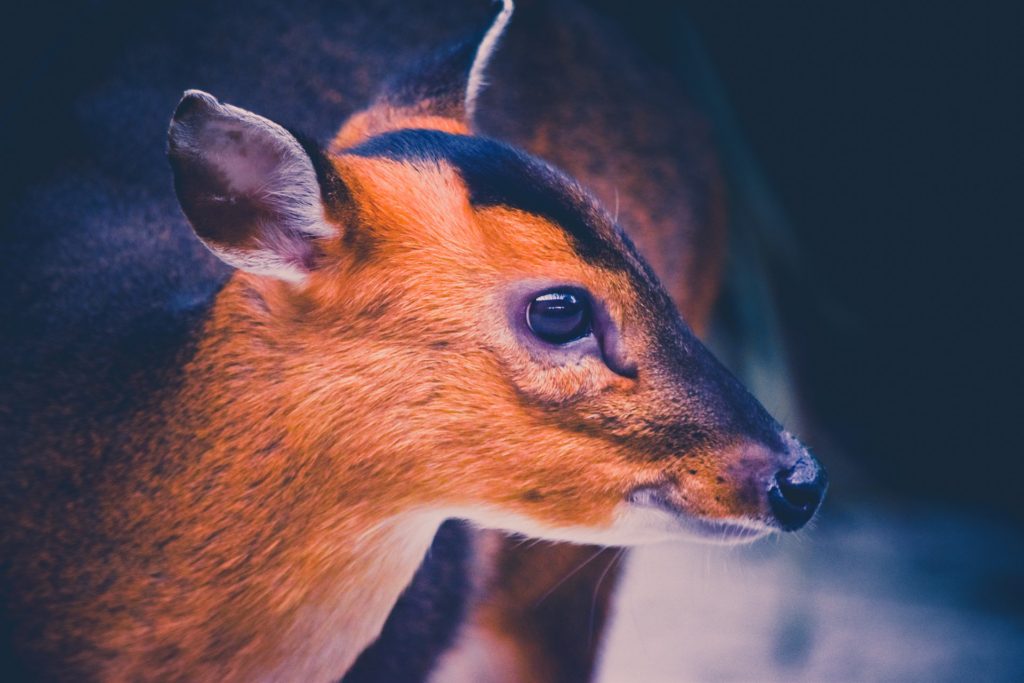Once upon a time, a young man named Ya’ai of the Amis tribe was out hunting wild goats and deer in the lush mountains surrounding his village. Though he had lost both his parents and found himself orphaned at a young age, he remained cheerful as he sang songs that his parents had taught him long ago.
Suddenly he heard something that caused the song to die on his lips. Following the cries into the woods, he came upon a huge python in a clearing that had wrapped itself around a doe. Carefully, Ya’ai took an arrow and shot at the great snake, wounding it. The python relinquished its hold on the doe and slithered away as fast as it could into the dense forest. Ya’ai then walked over to the doe and patting it, urged the animal to escape.
But the doe didn’t bolt towards the forest as Ya’ai had expected it would. Instead, it slowly got up and followed Ya’ai at a distance. Ya’ai, amused, shrugged his shoulders and headed home, with the doe following him all the way back.

The next morning after seeing no sign of the deer, Ya’ai assumed she had finally returned to the forest. He headed out to the mountains to hunt, but not meeting with any luck, returned home by noon. He had just entered his hut when he heard a rustling sound and scurrying of feet. Through a crack in the doorway, he beheld a beautiful young woman in his modest home.
Taken aback by her presence, Ya’ai threw the door open, stormed in, and demanded to know what she was doing there. Startled and embarrassed, the young woman asked if he recognized her. Ya’ai replied that he had never seen her in his life. That was when she revealed that they had met only the day before, when he saved her from being devoured by a python.
Ya’ai was shocked. She had been the doe he had rescued, but now, here she was in human form. She then surprised him further by asking if he would consent to his taking her for his wife. Seeing her beautiful and adoring demeanor and cognizant of her gratitude, Ya’ai accepted her proposal, and they became husband and wife. She became known simply as “Deer Maiden,” and she would accompany Ya’ai on his hunting trips and help him till the small plot of land on which they grew yams and other crops.
They loved each other very much and lived happily for a while until one morning, Deer Maiden told Ya’ai that she would forgo their usual excursions to hunt in the mountain as she wished to spend some time weaving. Ya’ai agreed to her decision but as he prepared to leave, Deer Maiden made it very clear that he should never enter the hut where she was weaving, and that he should never watch her at work. Though Ya’ai found this to be an odd request, he nevertheless agreed to his wife’s condition for privacy and left to go hunting.

Early that evening when Ya’ai returned home, he discovered that Deer Maiden had woven a magnificent suit of clothes for him. Ya’ai received the suit with astonishment and admiration in his wife’s talent and proudly wore his new clothing when he went to go hunting the next day. On his way out of the village, several people asked him about his new suit, demanding to know where he got it. Ya’ai tried to demur but after becoming flooded by so many questions, Ya’ai finally answered that his wife had woven them. Upon hearing this, the wives of his friends demanded that Deer Maiden show them how to make such wonderful garments as well.
 Remembering Deer Maiden’s request, Ya’ai apologized to his neighbors and explained that it would be impossible for anyone to watch her at work. But the neighbors and their wives cajoled until Ya’ai finally agreed to ask Deer Maiden if she would change her mind. That evening, he returned home and told Deer Maiden about his encounter with his friends and how they had requested that she teach them to weave.
Remembering Deer Maiden’s request, Ya’ai apologized to his neighbors and explained that it would be impossible for anyone to watch her at work. But the neighbors and their wives cajoled until Ya’ai finally agreed to ask Deer Maiden if she would change her mind. That evening, he returned home and told Deer Maiden about his encounter with his friends and how they had requested that she teach them to weave.
Deer Maiden apologized to her husband but remained adamant, insisting that no one could watch her weave. However, to appease the other villagers, she offered to make them all a new set of clothes. Ya’ai had no choice but to agree, but his curiosity was piqued. He had to know what his wife was hiding.
One day, he deliberately came home early from hunting and snuck into his house, tiptoeing as not to disturb his wife who was busy weaving in the other room. The door was opened a crack, so he peaked in. The scene inside took his breath away.
Seated with the loom was his wife, collecting the thread from which she carried out her amazing, unique weaving. But where did the thread come from? Ya’ai saw it come from herself, as she painfully plucked golden, radiant strands of fur from her torso and arms, thread that magically regrew every time she plucked a single hair. Over and over again, Deer Maiden allowed these strands to appear, only to pluck them off once they did so. Ya’ai watched his wife perform this slow and painful task and saw the tears that came to her eyes from the stinging pain that resulted from her actions.
Stricken with guilt and grief for his wife’s suffering, Ya’ai barged into the room and demanded that she stop weaving. Seeing her husband, Deer Maiden cried out in dismay. She tearfully explained that due to his failure to live up to his promise to never watch her weave, not only would she be unable to finish her work, they could no longer be together as husband and wife. With those words, Deer Maiden wrapped her arms around her face and head, as she dropped onto the floor and dissolved into wisps of smoke that floated out the window.
Realizing his mistake in betraying his wife’s trust, Ya’ai begged Deer Maiden to come back, but it was too late. He scoured the mountains and every valley every day for the rest of his life searching far and wide for his beloved Deer Maiden, but Ya’ai never saw her again.

Throughout Chinese folklore, you can find numerous examples of crossover relationships between the various realms of our universe. For someone like me who grew up exposed mostly to Western classics and living in a nonreligious, non-superstitious household, it’s simultaneously fascinating and also overwhelming to think about the complex universe that include realms for the living and the dead, gods and spirits, monsters and animals. And these different realms and their interactions with each other either help maintain balance or disrupt the universal balance is something that underpins not only Buddhist and Taoist beliefs, but also local spiritualism found in Taiwan’s indigenous cultures.
But maybe these ideas are not so foreign to Western folklore. We do see similar stories play out in Western mythology, the story of the minotaur for instance, who was born to a human mother who had a relationship with a bull, or of the countless instances where Zeus, the Greek god of thunder, seduces or abducts so many innocent human women by disguising himself as different animals.
The story of breaking of one’s promise can also be found in many Western fairy tales, the most famous of which being Adam and Eve’s ejection from Paradise upon eating from the Tree of Knowledge. Maybe these stories speak to the flaws and inevitable downfall of humans. Even though Ya’ai exhibited decency in saving the doe’s life, and even though he wanted to put a stop to his wife’s torturous task of weaving for her comfort, he violated a promise and suffered the consequences of his curiosity and ego.

References: Amis Tribe, “Deer Maiden” Fred H. Lobb, “Chinese Folk Tales” chinesefolktales.blogspot.com “Taiwan Folktales: Proverbs, Folk Sayings, and Folktales from Taiwan”






